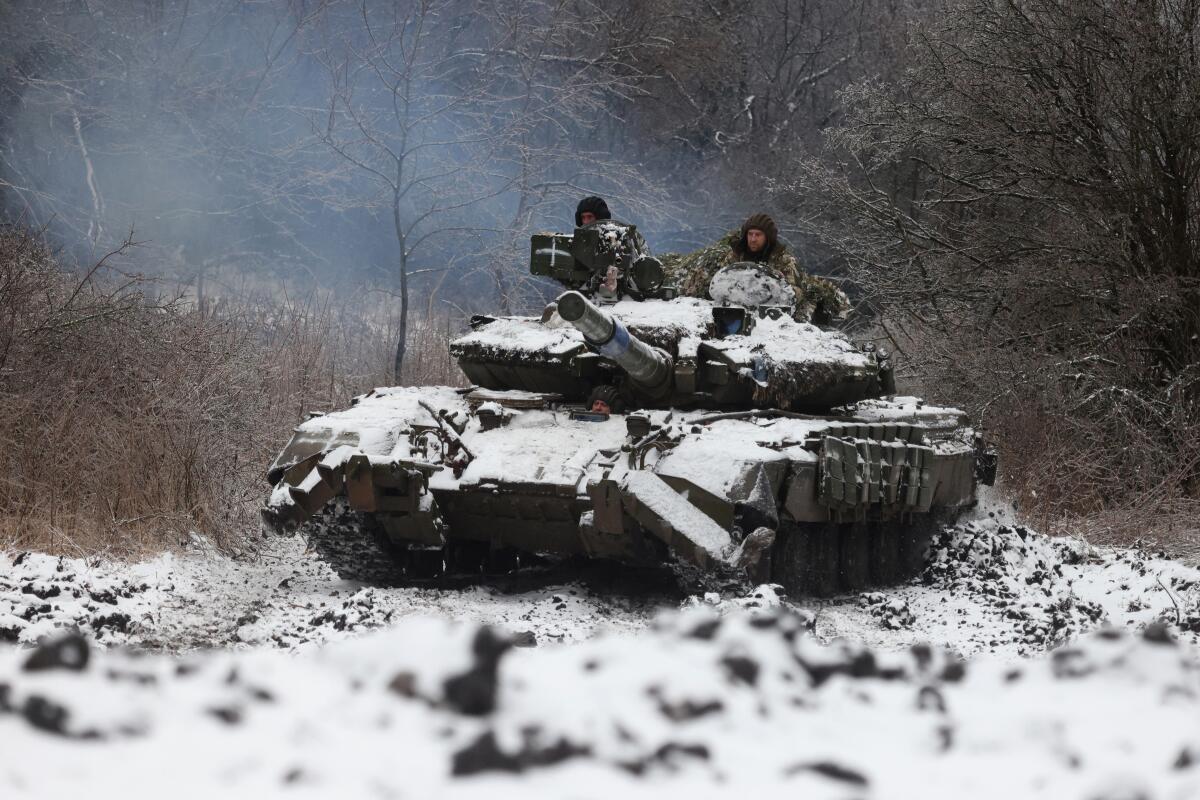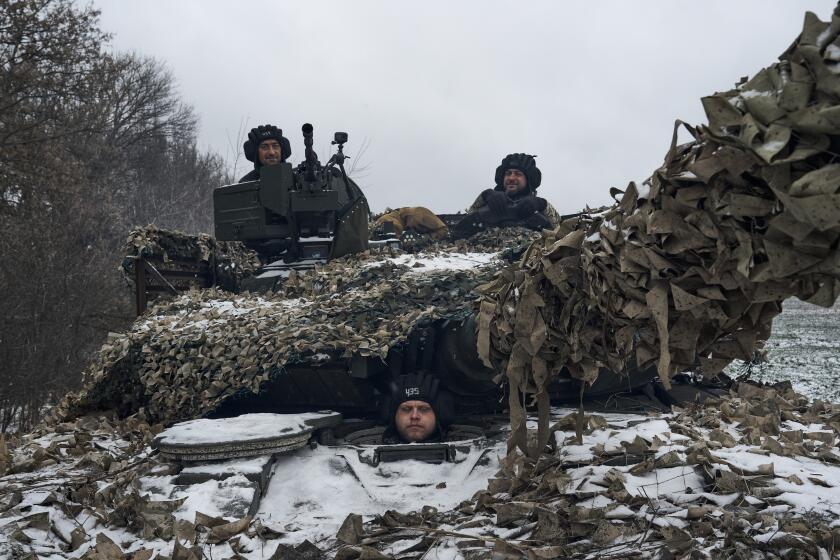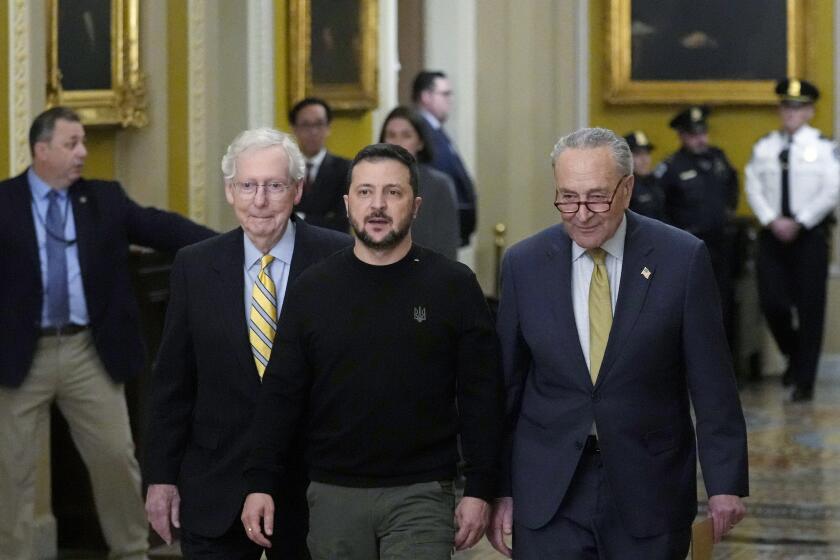Opinion: Talks can’t end the Ukraine war, because Russia lies

- Share via
Following the full-scale invasion by Russia in February 2022, Ukraine has suffered tremendously. Tens of thousands have died, and a quarter of the country’s prewar population has been displaced. Homes, neighborhoods and entire cities have been reduced to rubble.
Some question the wisdom of Ukraine continuing to fight back instead of seeking to negotiate with Russia. President Vladimir Putin himself claims he “does not reject the idea of peace talks,” while prominent figures have called for negotiations, possibly involving a settlement to cede occupied territories in exchange for peace.
The U.S. joined with other countries to freeze Russia’s assets, cap its sale of oil and use other economic tactics. Even as Putin’s war machine continues, here’s why sanctions remain worthwhile.
Calls for Ukraine to have such talks rely on an assumption that Russia would negotiate in good faith. But, looking to history as a guide, this assumption is naïve. Russia’s actions over the last 31 years reveal a troubling pattern of frequent lying and breaking international agreements. Negotiations with Russia are therefore futile.
Russia agreed to respect Ukraine’s territorial integrity and sovereignty and to refrain from the threat or use of force against Ukraine in both the Budapest Memorandum of 1994 and the Russian-Ukrainian Friendship Treaty of 1997. In an agreement partitioning the Black Sea Fleet after the fall of the Soviet Union, Russia agreed to pay Ukraine to lease a naval base in Sevastopol.
Republicans are holding aid to fight Russia hostage to their unreasonable demand for concessions from the Biden administration on immigration policy.
Seventeen years later, it illegally annexed that base and the rest of Crimea. In the Budapest Memorandum, Russia provided security assurances to Ukraine in exchange for Ukraine giving up its nuclear arsenal. Now, a nuclear power has launched a full-scale invasion of the state whose security it was supposed to protect.
Russia’s other neighbors have had similar experiences. Russia armed and fought on the side of separatists in both Georgia and Moldova.
The biggest worry for Ukrainians is what’s happening in Washington: Will the U.S. continue to help, and with what level of support?
In 1992, Russia signed two agreements ensuring the territorial integrity of Georgia and promising to avoid military involvement in its separatist conflicts. Yet in 2008, Russia invaded, falsely claiming that Georgia was committing genocide against South Ossetians to justify the war. In a cease-fire agreement brokered by the French president, Russia agreed to withdraw its troops from Georgia — but it never did. Fifteen years later, Russian troops continue to occupy 20% of Georgian territory.
Similarly, some 1,500 Russian soldiers are stationed in the Moldovan region of Transnistria, more than 20 years after Russia made two agreements to withdraw them.
Ukraine came under attack from the air and from cyberspace as projectiles rained down on a southern region and hackers knocked out cellphone service.
Russia has an abysmal track record of keeping agreements made with the countries it has invaded, including ones brokered by outside mediators and security organizations.
Perhaps Russia would be more likely to respect a treaty brokered by a powerful country such as the United States? Unfortunately, history provides no evidence for this assumption, either. Russia has broken every nuclear treaty it has signed with the U.S.
Under the Intermediate-Range Nuclear Forces treaty signed at the end of the Cold War, the U.S. and Russia agreed to ban missiles with ranges of 500 to 5,000 kilometers. Within the last decade, Russia secretly tested a cruise missile with a range of 2,500 kilometers and now deploys it in four battalions.
This year, Russia suspended its participation in the New START treaty. Moscow had already been refusing to restart mandatory inspections of its arsenal after a pause early in the COVID-19 pandemic. Even in its dealings with the U.S., Russia readily violates treaties and abandons them when convenient.
Russia has also shown a pattern of disregard for states throughout Europe and the Americas. Its interference in the 2016 U.S. elections, when Russia hacked into the computer servers of the Democratic National Convention and targeted voter systems in all 50 states, was broadly publicized in the media. Additionally, the Kremlin has illegally meddled in the elections of countries including Belarus, France, Georgia, Germany, Malta, Moldova, the Netherlands, Poland and Ukraine.
Russia has also conducted less subtle attempts at interference in foreign politics. The Kremlin attempted a coup in Montenegro a year before the country ratified its accession to NATO. Western intelligence concluded that a special unit of the Russian GRU planned to attack the Montenegrin parliament and assassinate the prime minister on the day of the parliamentary elections. This year, there have been allegations that Russia planned a similar coup in Moldova.
Russia’s readiness to ignore the sovereignty of other nations is also exemplified by its audacious assassinations of political opponents in broad daylight across Europe. In 2006, former British double agent Alexander Litvinenko died from radiation sickness in London after drinking a cup of tea poisoned with polonium-210. British investigators concluded the assassination, carried out by Russian FSB agents, was probably ordered by Putin.
In 2018, Russian intelligence poisoned another former spy, Sergei Skripal, in a park in Salisbury. He survived the attempt, but a British woman died after accidentally coming into contact with the poison. The following year, a Chechen insurgent fighter named Zelimkhan Khangoshvili was shot and killed by an FSB agent in the middle of a park in Berlin.
What is notable about these violent acts and attempts at election interference is that besides trampling on other states’ sovereignty, Russia consistently lies. According to Putin: “We didn’t meddle, we aren’t meddling, and we will not meddle in any elections.”
The Kremlin also mocked British investigations into the poisonings of Litvinenko and Skripal as “totally absurd.” Russia’s modus operandi has always been “deny everything and admit nothing.”
Those who argue that it is time for Ukraine to negotiate with Russia are overlooking reality. Russia has broken every peace treaty it ever signed with Ukraine, and many more with other states it has inflicted violence upon.
The Kremlin operates without regard for its neighbors, the United States, European countries, or any moral or legal boundaries. Putin has no reservations about interfering in democratic elections, plotting coups or murdering people even on NATO soil.
Negotiations hinge on having a modicum of trust in the other party’s commitment to honor agreements, but Russia has demolished any grounds for trust.
Anastassia Fedyk is an assistant professor of finance at the Haas School of Business at UC Berkeley. Tatyana Deryugina is an associate professor of finance at the University of Illinois at Urbana-Champaign. Emilia Marshall, a research fellow with Economists for Ukraine, contributed to this article.
More to Read
A cure for the common opinion
Get thought-provoking perspectives with our weekly newsletter.
You may occasionally receive promotional content from the Los Angeles Times.














